#hinduphilosophy
Text
It's always "respect all religions" until it comes to Hinduism. Like Hello 👋 where did ur respect went???
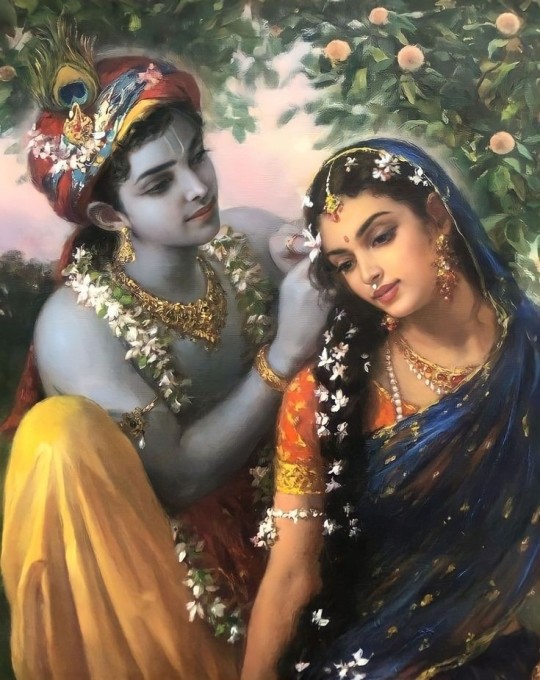
#hindublr#hindu lives matter#hinduphobia#hinduphilosophy#save sanatan dharm#sanatandharma#desi tumblr#desiblr#desi tag#india
7 notes
·
View notes
Text
Mandukya Upanishad - An ancient Sanskrit text on the nature of Reality
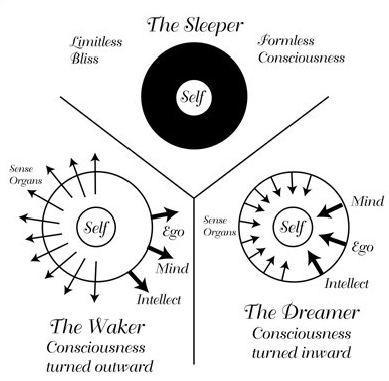
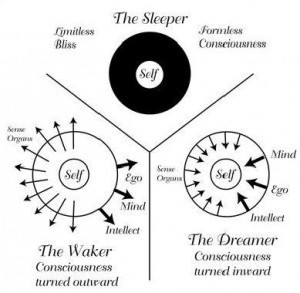
Mandukya Upanishad
Mandukya Upanishad - An ancient Sanskrit text on the nature of Reality by James Swartz, guides the reader through the Mandukya. The aim of the Mandukya is to analyze the creation and arrive at truth, the limitless I. From the introduction:
"The Aranyakas or Upanishads, the third portion of each Veda, commonly known as Vedanta, agrees and delivers an “absolute” knowledge that, under the right circumstances, reveals the limitless blissful Self and destroys the suffering arising from the belief in oneself as a limited being."
Download the book here:

Mandukya Upanishad
What is the Mandukya about?
The Mandukya Upanishad is one of the principal Upanishads in Hindu philosophy. The text is notable for its discussion of the concept of Om and the theory of four states of consciousness. Here's a brief overview:
- Context and Significance: The Mandukya Upanishad is the shortest of all the Upanishads and is associated with the Atharvaveda. Despite its brevity, it's highly revered in the Vedantic tradition for its profound philosophical insights.
- The Symbol of Om: A significant portion of the Upanishad is dedicated to explaining the symbol 'Om' (AUM), which represents the ultimate reality and is considered the essence of the Vedas. The text elaborates on how each part of 'AUM' corresponds to different states of consciousness and aspects of the universe.
- Four States of Consciousness: The Mandukya Upanishad introduces the concept of four states of consciousness:
- Waking (Jagrat): The external, material state, where consciousness is turned outward.
- Dreaming (Swapna): The internal state, where consciousness is turned inward.
- Deep Sleep (Sushupti): The state where there is neither desire nor dreams, and consciousness is unified.
- Turiya: The fourth state, representing pure consciousness itself, beyond the previous three states. It is described as the background that underlies and transcends the other three states.
- Philosophical Interpretations: The Upanishad has been the basis for various philosophical interpretations, especially in the Advaita Vedanta tradition. Adi Shankara, a revered Indian philosopher, wrote an extensive commentary on the Mandukya Upanishad, emphasizing the non-dualistic (Advaita) nature of reality.
- Influence: The teachings of the Mandukya Upanishad have deeply influenced various schools of Hindu philosophy, especially those concerning the nature of reality, consciousness, and the ultimate truth.
- Spiritual and Meditative Practices: The Upanishad has also been used as a guide for meditation, with practitioners often focusing on the symbol 'Om' to transcend ordinary states of consciousness and realize the unity of the self with the ultimate reality.
The Mandukya Upanishad, with its profound and concise teachings, continues to be a significant text in the study of Hindu philosophy and spirituality.
Read the full article
#blissfulSelf#Hinduphilosophy#jagrat#JamesSwartz#limitlessI#Mandukya#natureofReality#Sanskrit#suffering#Sushupti#Swapna#Turiya#Upanishad#Vedanta
4 notes
·
View notes
Text
DEFINING HINDUISM

Though I've been an atheist and still am one. Being born into a Hindu family has always made me proud. And the reason for this is that, after decades of research on spiritualism, particularly how it began and evolved from India through the Hindus, I've concluded. Hinduism is more than just a religion. So, if you're interested in understanding more about Hinduism and its nuances, let me tell you about my understanding of Hinduism.
In my view, a Hindu is an atheist, polytheist, monotheist, and henotheist. He is henotheistic because he believes in only one God yet acknowledges the presence of other deities and subsidiary gods. For example, while Shiva is the most superior Hindu god, Hindus also worship many other lesser gods to whom there is no end or limit. This means that a Hindu can pray to anything around - a tree, a cow, a mountain, a stone or a river.
This distinguishes Hinduism from all other religions. It is a philosophy, even though now muddled up with supernatural beliefs and traditions. Hinduism cannot be called a religion. It's a way of life for them. It arose from various interconnected thoughts such as demographics, cultural practices, and ancient philosophical scriptures and teachings.
It evolved over thousands of years and is the oldest known religion globally. All beliefs and myths add up from one generation to another—philosophers, pundits, commentators, interpreters, gurus, etc.
Each of them comes up with their names, concepts, and supernatural beliefs. Many religions, including a subset of religions, have been influenced by Hinduism, including Sikhism, Jainism, Buddhism, etc. I'd go so far as to say it's the mother of all religions.
According to Yajurveda, "All living beings are equally divine." As a result, when all living creatures are equally divine, and the Hindu religion accepts everyone and allows other religions to coexist in its embrace, it must have been the mother of all ideologies.
Add to that the fact that there is no conversion in Hinduism from one religion to another. It also doesn't have a founder or any precepts. It consists solely of Mahavakyas or great sayings.
The Hindus in Hinduism
Let's take a closer look at the term "Hindu." The Persians coined the term "Hindu," which they used to describe the people who lived beyond the Shindus River. They couldn't distinguish between the sounds "SA" and "Ha" when pronouncing the word Sindhu, So Sindhu turned Hindu.
As you must have noticed, there is no -ism in it. The term "Hinduism," which relates to the Hindu people's religion, was coined later. They could not understand its true nature as an outsider looking in and just called it a religion. Hinduism is a way of life, not a religion, to realise one's full potential.
God in Hinduism is that of pure consciousness. A final destination for Aatma (the soul) to realise absolute awareness. In Hinduism, unlike any other faith, the Creator and creation are the same. There is no distinction. Since you have that divinity within you, you are that potential divine. This means God is the highest state of pure consciousness to liberate the human body and mind we call Moksha.
The above implies that the divine exists because of you, the earth exists because of you, the universe exists because of you, and everything exists because of your aware-conscious energy contained in the soul. You, as the potential divine, came first, and god followed.
The Knowledge of Self
In Hinduism, this is what is divine. So, with this spiritual knowledge, the most crucial thing in life is not to follow traditions but self-knowledge for that self-awakening to realise self-awareness of who we are beyond body and mind. This self-awareness teaches you that God, Guru, and the Self are one. Advaita Vedanta is the name given to that absolute non-dual state of aware energy; the supreme ability of energy - Brahman referred to as Parabrahman or Paramatma; par meaning beyond.
All of this sprang from four Upanishad mahavakyas. When they declared, "Prajnanam Brahma," - Insight is the creator of everything in the cosmos (Brahman). The second, "Ayam Aatman Brahma", is Brahman - the Soul, which contains the spirit. Third, "Tat Tvam Asi" - That art Thou, and the fourth is "Aham Bhramasmi," which means "I am that Brahman, the one in many and the many in One - total energy.
The Vedas are the foundational texts of Hinduism; it concludes with Advaita Vedanta, which is the essence and philosophical knowledge of the Upanishads.
Let us now consider how supreme and sublime the entire concept of Hinduism's scriptures is. Perhaps this is why the Upanishads offered us four life goals to follow.
These four goals in life are Dharma, Artha, Kama, and Moksha.
· One of the numerous meanings of Dharma is righteousness, which means the divine order of the human person.
· The second purpose is Artha, which aims for economic growth.
· The Kama is the third. It is to fulfil your essential desires and, finally, to be satisfied.
· The ultimate objective for Hindus is to achieve Moksha or liberation.
Sanatan Dharma is the actual name of Hinduism. Sanatana is Sanskrit for "eternal law." And Dharma is the order of righteousness, formed by combining two words into one.
As to how?
Dharma refers to how you should live, whereas karma refers to how you are already living, with the Sanatan – eternal laws filling in the gaps.
The universal law of eternity, the universal rule of righteousness, the universal law of non-duality, where there is no duality or relativity; because the truth, God, and everything else is related towards duality in our mind to its opposite?
All you need to do now is awaken that God, the Atma, in the centre. So that the soul can check and guide the mind to make it alert, attentive and aware to progress from lower to higher consciousness towards non-duality in absoluteness for that ultimate fulfilment.
Therefore, Hinduism is different from all other religions. It teaches you that salvation is found more in your religiousness, devoutness in religiosity. To awaken and liberate from the clutches of the material mind experiencing to realise that the God Guru and the actual Self are lying dormant within.
Namaste, and thank you once again for giving me your precious time.
#hinduism#sanatandharma#vedas#upanishads#atman#brahman#advaitavedanta#selfknowledge#moksha#dharmic#divineconsciousness#karma#polytheism#hinduphilosophy#henotheism#spiritualism#vedicwisdom#ancientreligion#wayoflife#motherofallreligions.#Spotify
2 notes
·
View notes
Photo
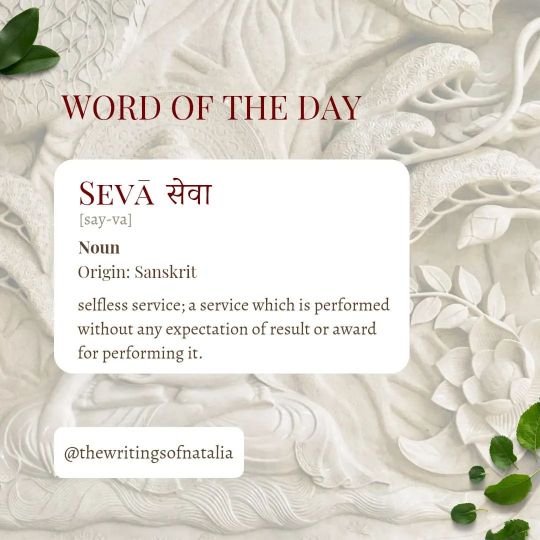
Seva is a general practice in Buddhist sects as well as Yogic. It involves helping and being of service to others without expecting anything in return. Read our latest post on how Seva can improve your daily life. ▪︎Link in bio▪︎ . Follow @thewritingsofnatalia for more information and inspiration related to your Spiritual and personal growth journey ✨ . . . #seva #selfless #selflessservice #Buddhism #Buddhist #buddhismphilosophy #buddhateachings #buddhistphilosophy #buddhismteachings #buddhistteachings #Hindu #Hinduism #hinduphilosophy #easternphilosophy #easternspirituality #beofservice #feedpeople #loveallserveall #personalgrowth #personaldevelopment #spiritualjourney #Spiritualgrowth https://www.instagram.com/p/CfsCvUKPO0q/?igshid=NGJjMDIxMWI=
#seva#selfless#selflessservice#buddhism#buddhist#buddhismphilosophy#buddhateachings#buddhistphilosophy#buddhismteachings#buddhistteachings#hindu#hinduism#hinduphilosophy#easternphilosophy#easternspirituality#beofservice#feedpeople#loveallserveall#personalgrowth#personaldevelopment#spiritualjourney#spiritualgrowth
3 notes
·
View notes
Text

क्या इजराईल के ज्यूस वास्तव में भारत के यदुवंशी है?, क्या कृष्णा ही मोसेस थे!
एक ईश्वर!
श्री कृष्ण ही मोस्सेस थे !
इसका एक प्रमाण यहाँ मिलता है ..
कृष्ण का जन्म कारागार में हुआ | वासुदेव वहां से उनको लेकर निकले और एक टोकरी में अपने सर के ऊपर रखकर वे गोकुल पहुंचे | वहां नंद बाबा ने उनका पालन पोषण किया| हिब्रू शास्त्रों में कहा जाता है की मोसेस एक लेवी परिवार में पैदा हुये| लेकिन वहां के राजा हिब्रू बच्चों को मारना चाहते थे |
मोसेस की मां ने पहले बच्चे को अपने गर्भ को छुपा के रखा| जब वह बच्चा दो-तीन महीने का हो गया तब उसको एक टोकरी में डाल कर नदी में बहा दिया| इस परंपरा में नवजात कृष्णा एवें मोसेस को पानी से दूसरे स्थान पर ले जाने का वृतांत मिलता है |
𝐅𝐨𝐫 𝐌𝐨𝐫𝐞 𝐈𝐧𝐟𝐨𝐫𝐦𝐚𝐭𝐢𝐨𝐧 𝐰𝐚𝐭𝐜𝐡 𝐯𝐞𝐝𝐢𝐨 𝐨𝐧 : https://youtu.be/xBtr2kO4DAc?si=rbQskOIvt6WAgGjY
#JewishMythology#MythologicalParallel#BiblicalReferences#HinduPhilosophy#KansaVsMoses#RukminiLoveStory#AmavasyaSignificance#CulturalConnections#IsraeliApartheid
0 notes
Text
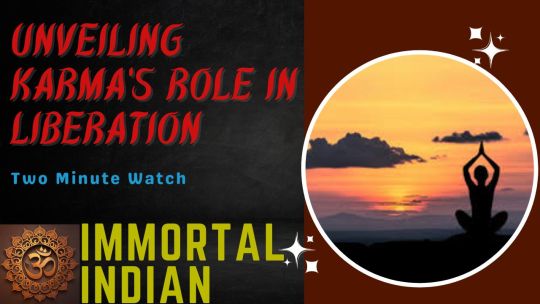
Unveiling Karma's Role in Liberation
Embark on a journey of enlightenment as we explore the profound concepts of karma and liberation in our latest video. Understand how our actions shape our destiny and the path toward spiritual freedom. Join us to unravel the secrets of the soul's journey and the quest for ultimate liberation. #wisdomteachings #innerpeace #soulImmortality #veda #vedasInsights #wisdom
0 notes
Text
youtube
#srirudram#UntoldStories#Hinduism#BhaktiOne#hinduism#lordshiva#SpiritualJourney#IndianCulture#chamakam#HinduPhilosophy#Wisdom#AncientSages#hindutva#mythologicalstory#sanatanadharma#Youtube
0 notes
Text
Discover the profound teachings of the Bhagavad Gita, as it reveals the significance of Bhakti, the path of devotion. Dive into the transformative power of love, surrender, and spiritual awakening.
#ExoticIndia#ExoticIndiaArt#BhagavadGita#BhaktiBliss#Vedas#HinduPhilosophy#HinduSacredScriptures#HinduBooks
0 notes
Text
Story Behind Dakshina Murthy
Story Behind Dakshina Murthy
#DakshinaMurthy#LordShiva#Guru#Wisdom#Knowledge#SpiritualGrowth#DivineBlessings#HinduDeities#ShivaMantra#DakshinamurthyStotram#SacredArt#HinduPhilosophy#Yoga#Meditation#DivineWisdom#DivineTeacher#VedicWisdom
0 notes
Photo
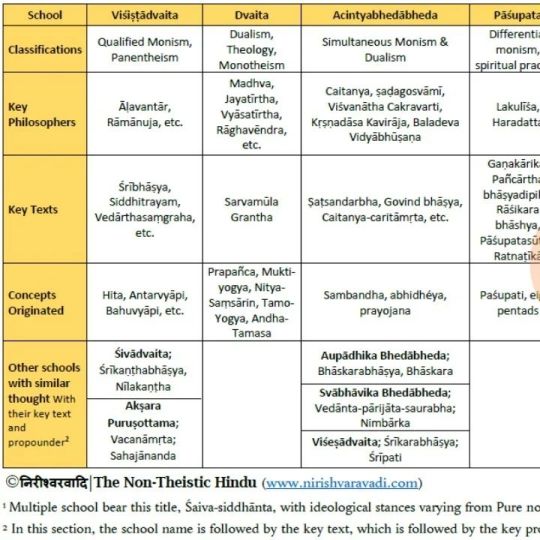
See all slides.. Follow us on Facebook as well @NonTheisticIndians #Hinduism #Hindu #HinduSects #HinduPhilosophy #HinduTraditions https://www.instagram.com/p/Cj4snB3LmXQ/?igshid=NGJjMDIxMWI=
0 notes
Video
youtube
"Eternal Echoes: Unraveling Vedic Mysteries" #Vedas #AncientWisdom #Spir...
"Unveiling the Mysteries of the Vedas." #Vedas #AncientWisdom #Spirituality #DivineRevelation #CosmicHarmony #Enlightenment #HinduPhilosophy #SacredTexts
0 notes
Text
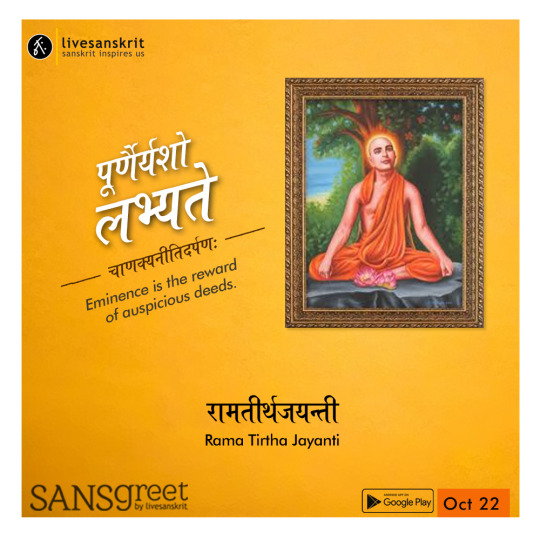
Send from Sansgreet Android App. Sanskrit greetings app from team @livesanskrit .
It's the first Android app for sending @sanskrit greetings. Download app from https://livesanskrit.com/sansgreet
Swami Rama Tirtha.
Swami Rama Tirtha (22 October 1873 – 17 October 1906), also known as Ram Soami, was an Indian teacher of the Hindu philosophy of Vedanta. He was among the first notable teachers of Hinduism to lecture in the United States, travelling there in 1902, preceded by Swami Vivekananda in 1893 and followed by Paramahansa Yogananda in 1920. During his American tours Swami Rama Tirtha spoke frequently on the concept of 'practical Vedanta' and education of Indian youth. He proposed bringing young Indians to American universities and helped establish scholarships for Indian students.
#sansgreet #sanskritgreetings #greetingsinsanskrit #sanskritquotes #sanskritthoughts #emergingsanskrit #sanskrittrends #trendsinsanskrit #livesanskrit #sanskritlanguage #sanskritlove #sanskritdailyquotes #sanskritdailythoughts #sanskrit #resanskrit #celebratingsanskrit #swamiramatirtha #ramatirtha #ramsoami #indianteacher #vedanta #practicalvedanta #punjabi #punjab #tehri #hinduism #hinduphilosophy #indianphilosophy #advaitavedanta #swamivivekananda
#greetingsinsanskrit#sanskritgreetings#sanskrittrends#trendsinsanskrit#livesanskrit#sanskrit#celebratingsanskrit#swami
0 notes
Text
It is considered that Hindus are andhbhakts and Hinduism is denounced by derogatory remarks "drink cow piss " . I want to say , in Hinduism nobody is forced to drink cow piss and nobody does this except people in rural areas . Even in rural areas , it is rare to find nowadays . We don't follow anything blindly , especially the young generation .
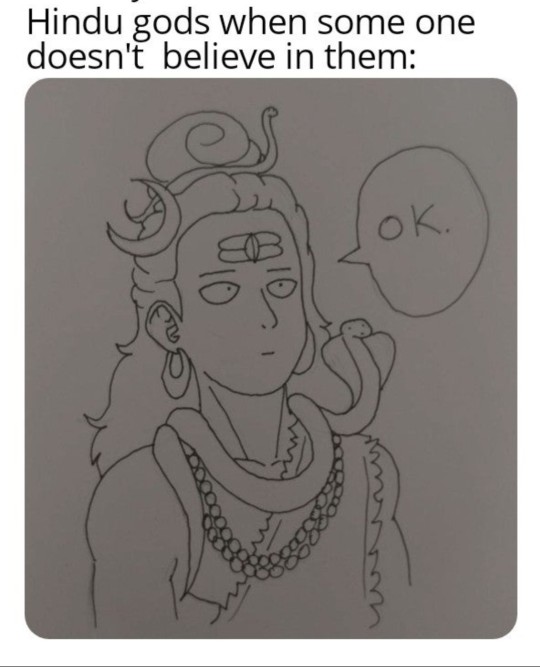
What is meant by this meme ?
• In Hinduism , even if you leave this dharma or unbelieve in god , you will not go to hell . You will go to hell only on the basis of your karma . Hindu gods doesn't give a damn .
• Some say , Hinduism is so cringe and oppressive . I say , "casteism and brahminism is the major fault in Hinduism " which is irrelevant to modernisation and humanity .
• Some say , " the fucking pandits chant hanuman chalisa horrible andhbhakt" . Isn't this hurting? What's wrong in chanting mantras ? Mantras release high energy which generate our chakras and have a scientific effect on human bodies. Do you think only in Hinduism , andhbhakti is applied ? No child . In other religion , patients drink camel urine to cure COVID . Then why Hinduism is targetted among all the religions ?
• In Hinduism , it is never said that if you disbelieve in main idol , you will face sever punishment in hell (it's mentioned in books of other religion). Krishna says , disbelievers disbelieve on my wish . He never mentioned that "you will face hell for disbelieving in me". This is stupid. He says do your karma . And regarding atheists ,he said , they are diverted from the path of spiritualism and hence far away from moksha . The concept of God and spiritualism is difficult to understand .
• Hinduism and Hindus are not privileged . Hinduism is the third largest religion followed after Christianity and Islam . Hinduism is concentrated only in Indian areas and converters try to convert Hindus to other religion .
•Yes , in every religion , extremism is a curse to getting close to supreme god. But anti hindu hate exists , hindus are also hated. Western books has disrespected Hinduism by denying its identity as a religion.
• In baghwad Geeta , it's mentioned that do not use hinsa (voilence) unnecessarily (Krishna says this to Arjuna) . Attack only if you are attacked .
• some have objection regarding celebrating Ganpati festival and idol worship . This is so offensive and hypocritic. When there is halloween or Christmas or Eid people enjoy and get busy in their preparation and follow the usual tradition . The excitement that kids in the family feel when the festive season is near . This is something done for memories and cherishing joy .
• In Hinduism , references of homosexuality is already mentioned . It's the society who is mean.
Again , Hinduism has many major faults like casteism. This the reason why sects like Buddhism and Jainism were created.
#hinduphobia#hindusim#desiblr#hindudharma#hindufestival#india#savebangladeshihindu#hindu blog#hinduism#hinduphilosophy#india news#indian style#hindutemple#traditional family#traditionalism#desiblogger#desi#desi tag
268 notes
·
View notes
Text

#sanskrit#life quote tumblr#deep thinking#india#female writers#poets corner#life quote of the day#life quotes#life quote motivation#life questions#hindu mythology#hinduism#indian hindus#hinduphilosophy#language#indian culture#desiblr#desi aesthetic#desi tag#desi#hindugods#spilled thoughts#spilled ink#spilled work#spilled pages#spilled prose#poetsandwriters#dark acadamia aesthetic#spilled words
144 notes
·
View notes
Text
It’s sad how so much of society is so afraid of depression that they alienate those who are suffering. Or any mental health condition. “Posi-vibe only” people commit heinous acts of violence without even knowing it, they think they are doing good in the world by declaring: “this is positive, that is negative”.
True understanding and compassion comes from emotional depth— true experience of the darkest dark and lightest light. They are the same force. It lives in all of us— you can’t have one without the other. One isn’t better than the other either.
A piano with only the white keys is a limited concept and the music eventually becomes dull and pointless. Same goes for a piano that only has the black keys.
What would an instrument sound like if all the mechanics and notes were the same as a piano— but the keys were not differentiated like: “thinner raised black keys/lower flat white keys” but they were all the same shape and level and just— grey? No guide to where octaves start and end. No guide to what is sharp or flat.
How different would we perceive and think from a shift that the familiar composition standard of the piano layout turns into this? What would it all sound like?

#music theory#taoist#new age#mania#philosophy#nihilism#anarchy#christianity#zen#buddhism#norse pagan#hinduphilosophy#experimental#satanist#realization#muslim#religion#capitalism#communism#bipolor#sorry for being depressing#positive#negative#yin yang#posivibes
11 notes
·
View notes
Photo

#hindu #india #filosofia #saber #philosophy #sophya #sofia #budha #socrates #kuthumi #consciousness #consciencia #filosofiahindu #hinduphilosophy #estudo #conhecimento #krishna #descartes #buda #shreembrzee #pramāṇas #philosophy #hinduimo #darshana https://en.wikipedia.org/wiki/Hindu_philosophy Hindu Philosophy Filosofia Hindu A filosofia hindu abrange as filosofias, visões de mundo e ensinamentos do hinduísmo que surgiram na Índia Antiga . Estes incluem seis sistemas ( shad-darśana ) - 1-Sankhya , 2-Yoga , 3-Nyaya , 4-Vaisheshika , 5-Mimamsa e 6-Vedanta . Na tradição indiana, a palavra usada para filosofia é Darshana . Esta palavra vem da raiz sânscrita drish (ver, experimentar). *pramāṇa* A epistemologia é chamada de pramāṇa . Tem sido um campo de estudo chave e muito debatido no hinduísmo desde os tempos antigos. Pramāṇa é uma teoria hindu do conhecimento e discute os meios válidos pelos quais os seres humanos podem obter conhecimento preciso. O foco de pramāṇa é como o conhecimento correto pode ser adquirido, como se sabe, como não se sabe e em que medida o conhecimento pertinente sobre alguém ou algo pode ser adquirido. Textos hindus antigos e medievais identificam seis pramāṇas como meios corretos de conhecimento e verdades precisas: 1-Pratyakṣa - percepção direta 2-Anumāṇa - Inferência ou percepção indireta 3-Upamāṇa - Comparação e analogia 4-Arthāpatti - Postulação, derivação das circunstâncias 5-Anupalabdi - Não percepção, ausência de prova 6-Shabda - Palavra, testemunho de especialistas confiáveis do passado ou do presente. (em Vila Industrial, São Paulo-Sp) https://www.instagram.com/p/CRRHo4nn36b/?utm_medium=tumblr
#hindu#india#filosofia#saber#philosophy#sophya#sofia#budha#socrates#kuthumi#consciousness#consciencia#filosofiahindu#hinduphilosophy#estudo#conhecimento#krishna#descartes#buda#shreembrzee#pramāṇas#hinduimo#darshana
2 notes
·
View notes